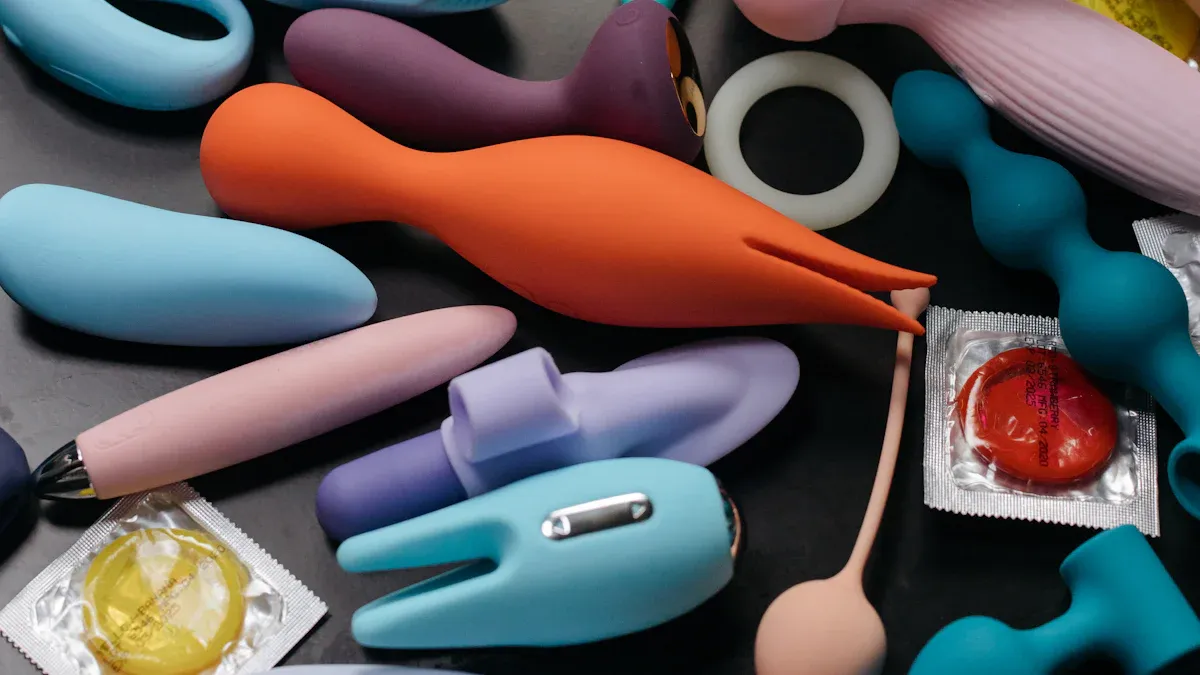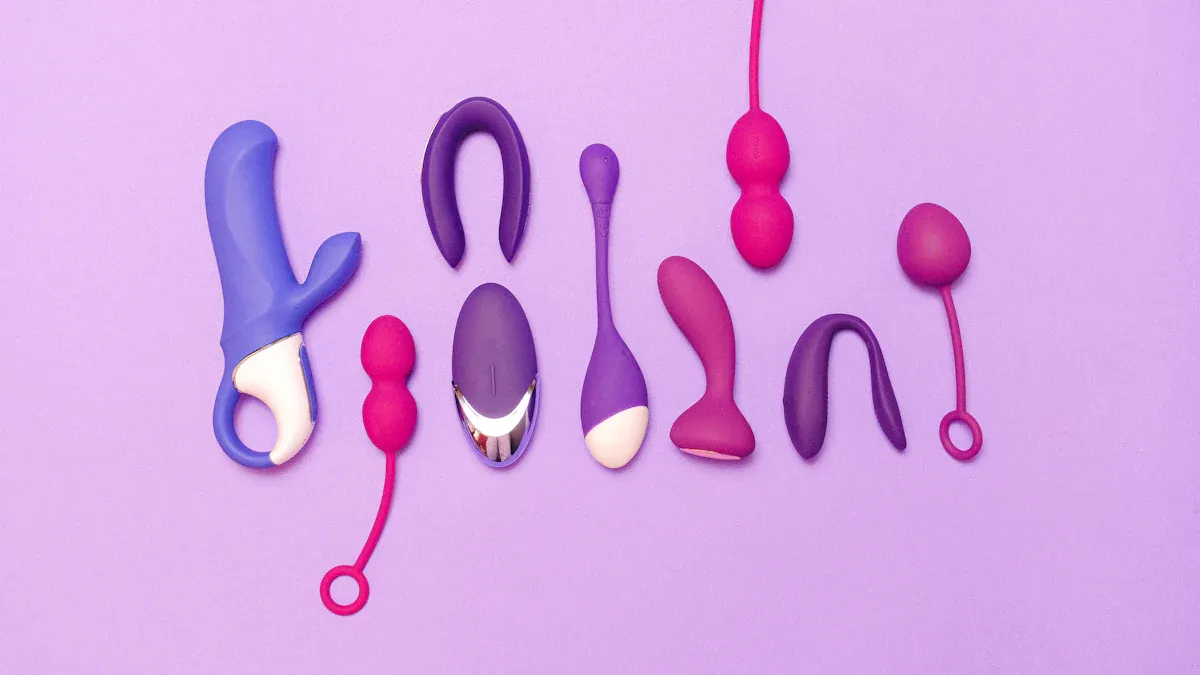Are PVC Dildos Safe to Use in 2025

You might ask if pvc dildos are safe in 2025. Some studies say pvc dildos can let out harmful chemicals like phthalates. These chemicals can mess with your hormones and hurt your health. Not all pvc dildos have these chemicals. But the material is porous, so cleaning is tough. This can make it easier to get infections. You cannot just use smell to know if it is safe. There are more rules for the industry now. But safety still depends on what you pick. Your sexual health is important, so always check what is in your dildo. This is true for Luminous Dildos, bad dragon dildo, or Snake Dildos.
What Are PVC Dildos

PVC Material Basics
You may see many pvc sex toys in stores or online. PVC stands for polyvinyl chloride. This plastic feels soft and flexible. Makers add chemicals to make it bend and stretch. These chemicals can change how the dildo feels in your hand. Some pvc dildos look shiny or bright. Others have a matte finish. You might notice that pvc sex toys can come in many shapes and sizes. The material quality can change from one brand to another. Some pvc sex toys feel sticky or oily. Others feel smooth and dry. You should always check how a pvc dildo feels before you use it.
Why PVC Is Used
Many companies use pvc for sex toys because it is cheap and easy to shape. You can find pvc dildos in many colors and designs. The low cost makes them popular. Take a look at this table to see how the cost of making different dildos compares:
Material | Production Cost | Notes |
|---|---|---|
PVC | Low | Easy to make, but safety concerns |
Silicone | High | Best for safety, higher material cost |
Glass | Medium-High | Handmade, shipping adds cost |
You may notice that pvc sex toys cost less than silicone dildos. This makes them easy to buy if you want to try a new dildo. Some people like pvc sex toys because they are soft and flexible. Others choose them for the bright colors. You should remember that not all pvc sex toys have the same safety level. Always check the label and look for trusted brands.
Health Risks of PVC
Chemical Exposure and Phthalates
When you use pvc sex toys, you may come into contact with phthalates. These are chemicals added to make the plastic soft and flexible. Many experts call phthalates endocrine disruptors because they can change how your hormones work. You might not see or smell these toxic chemicals, but they can still leach out of the toy and enter your body through your skin.
Phthalates can lower your estrogen and testosterone levels.
They can cause problems with fertility, like poor egg or sperm quality.
Some studies link phthalates to early puberty, miscarriage, and even cancer.
Doctors have found phthalates in amniotic fluid and breast milk, which shows how easily they spread in the body.
In men, phthalates can lower sperm count and quality.
In women, they can raise the risk of endometriosis and PCOS, which are major causes of infertility.
⚠️ Note: Even if you see “phthalate-free” on the label, not all pvc dildos are truly free from these toxic chemicals. Always check for clear safety information from trusted brands.
Porosity and Infection
Pvc sex toys have a porous surface. This means tiny holes and spaces can trap bacteria, viruses, and even fungi. When you use a porous dildo, you cannot fully clean it, even if you wash it with soap and water. Germs can hide deep inside the material. This raises the risk of infections, especially if you share toys or use them for both vaginal and anal play.
Porous toys absorb fluids and bacteria, making hygiene hard to maintain.
You may notice a sticky or tacky feeling on the surface, which can signal trapped germs.
Infections like yeast infections, urinary tract infections, and bacterial vaginosis can happen more often with porous toys.
Cleaning does not remove all germs, so the risk stays high over time.
🧼 Tip: If you want to stay safe, use a condom over your pvc dildo every time. This helps protect your health and makes cleaning easier.
Material Breakdown and Color Changes
Over time, pvc sex toys can break down. You might see changes in color, texture, or smell. These signs mean the toy is no longer safe to use. As the material ages, it can release more toxic chemicals and become even more porous.
Look for visible tears, dark marks, or changes in flexibility.
A foul odor, like a “new car smell,” often means phthalates are leaking out.
Some toys may melt, sweat oils, or feel sticky as they degrade.
If you see any of these signs, you should stop using the dildo right away.
🚩 Alert: Always store your pvc sex toys in a cool, dry place. Heat and sunlight can speed up material breakdown and increase potential health risks.
You should always pay attention to the health risks of pvc. Using a pvc dildo may seem easy and cheap, but the potential health risks are real. You cannot ignore the dangers of toxic chemicals, infections, and material breakdown. Your safety and hygiene matter most. Choose toys that protect your health and give you peace of mind.
Phthalate-Free PVC Dildo Claims
What “Phthalate-Free” Means
You might see many pvc sex toys that say “phthalate-free.” This means the maker says the dildo does not have phthalates. Phthalates are chemicals that make plastic soft. Many people want toys without phthalates because these chemicals can hurt your health. You may think this label means the toy is totally safe. But the rules for using this label are not always clear or strict.
📝 Note: In Europe, rules like REACH limit how much phthalates can be in sex toys. Companies must make sure their products are safe, but there is no strict rule for labeling a dildo as “phthalate-free.” In the United States, there are no specific rules for this label on pvc sex toys. Labels may look official, but they do not always follow a set standard.
European rules help keep phthalates low in sex toys.
“Phthalate-free” labels do not always follow strong laws.
You should look for trusted brands and clear safety facts.
Are They Really Safer
You might wonder if a phthalate-free pvc dildo is really safer. Many companies now use other chemicals called plasticizers to make pvc sex toys soft. Some of these are DOTP, DEHT, DINCH, and more. DOTP is thought to be safer than phthalates, but experts still have questions about it. Some studies say these new plasticizers do not act like phthalates, but scientists do not know everything yet.
Phthalate-free pvc dildos from trusted brands often use plasticizers that avoid other bad chemicals like Bisphenol A. Some companies use special mixes to make their toys non-toxic and less porous. This can make the dildo safer and easier to clean. You should always buy from brands that share clear safety details and avoid toys with unknown ingredients.
⚠️ Alert: Even if a dildo says “phthalate-free,” it may still have other chemicals you do not want in your body. If you want the safest choice, pick toys made from silicone, glass, or metal.
Body Safe Sex Toys: Alternatives to PVC

Recommended Materials
There are many safer choices than pvc sex toys. Health experts say you should use non-porous, body-safe materials for your dildo. These materials do not let germs hide inside. This helps you stay clean and lowers your chance of getting sick. Here are some good options:
Medical-grade silicone: This is hypoallergenic and non-porous. It is simple to wash. Silicone dildos feel soft and bendy. They come in many shapes and colors.
Borosilicate glass: Glass toys are strong and do not have pores. They can handle hot or cold. You can clean them well and they are safe for your body.
Stainless steel: These dildos are heavy and do not rust. They are non-porous and easy to wash. You can use any lube with them.
ABS plastic: This hard plastic is safe and does not have phthalates. It is non-porous.
Properly glazed ceramic: Ceramic dildos are safe if the glaze is not broken. They do not let germs in.
You should not use porous materials like jelly rubber or PVC. These can keep germs inside and may have bad chemicals.
How to Choose Safe Toys
When you buy body safe sex toys, always read the label and box. Pick toys made from body-safe stuff like silicone, glass, or stainless steel. Silicone dildos are a great pick because they are easy to clean. Glass and metal dildos are also safe and last a long time.
🛡️ Tip: Pick toys with marks like FDA approval, CE mark, or ISO. These marks mean the dildo follows strict safety rules.
Look for clear warnings, how to use it, and sealed packaging. Do not buy toys that smell strong or have unclear labels. Some fake toys online say “silicone” but really have TPR or PVC. These can hurt your skin or cause burning. Buy from brands and stores you trust to keep yourself safe.
If you want the cleanest choice, pick silicone dildos or glass sex toys. These safe toys let you have fun without worry.
You should always care about your sexual health. In 2025, people still worry about PVC dildos. They can have tiny holes and sometimes have chemicals. Picking a dildo made from safe, non-porous stuff like silicone or glass is safer. This helps you feel better and worry less. If your skin feels sore after using a dildo, do these things:
Wash the dildo with soft, unscented soap and rinse it well.
Make sure it is dry before you put it away.
Keep it in a clean bag.
Doctors say you must clean your toys every time. Do not share them unless you use protection. Learn more and make smart choices to keep yourself safe and healthy.






